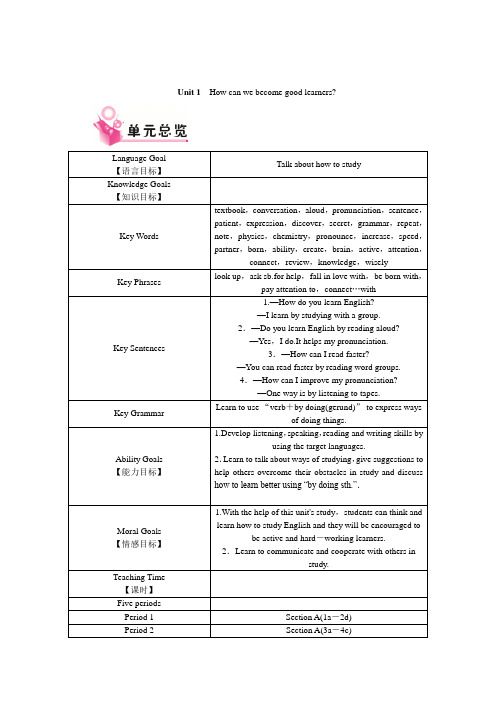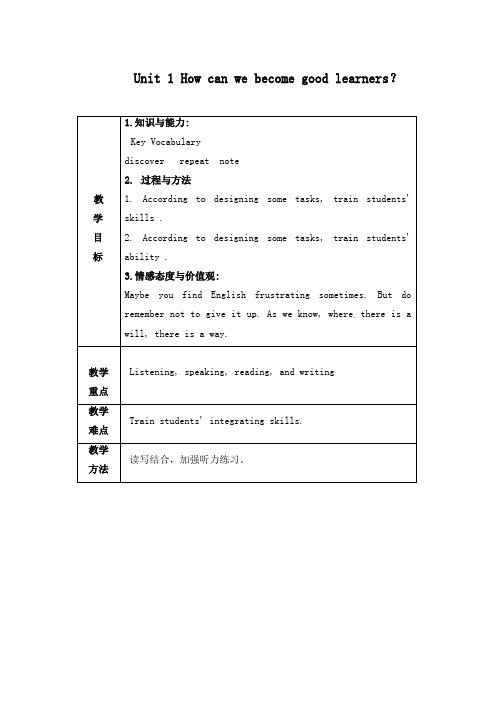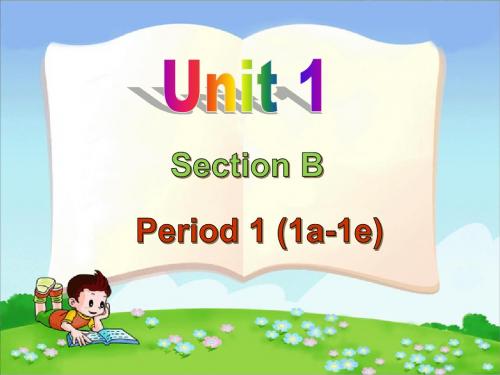部编RJ人教版PEP新目标 初三九年级英语 上册第一学期秋季 公开课堂教学课件Unit 5 Section B 第二课时
- 格式:ppt
- 大小:2.50 MB
- 文档页数:53



新人教版九年级上册初中英语全册优质公开课教案(教学设计)课程名称:Unit 1 My New Teachers教学目标:- 通过本节课的教学,学生将能够熟练掌握有关新老师的描述和表达。
- 提高学生的听说能力,培养学生的口语表达能力。
- 培养学生的合作意识和团队合作能力。
教学重点:- 研究掌握描述新老师的单词和短语。
- 学会运用所学词汇和句型描述自己的新老师。
- 学会询问他人关于新老师的信息。
教学准备:- 教师准备PPT课件,包括新老师的图片和相关单词短语。
- 学生教材和练册。
教学过程:1. 预导入:- 让学生在教材中找到与新老师相关的对话和信息,引发学生对新老师的讨论。
2. 新课呈现:- 通过PPT呈现新老师的图片,引导学生观察,激发学生对新老师的兴趣。
- 教师朗读并板书相关单词和短语,如:funny, strict, kind, teach, subject, etc.- 帮助学生理解这些词汇的含义和用法。
3. 听力训练:- 播放教材中与新老师有关的录音,要求学生仔细听,并回答问题。
- 教师带领学生讨论录音内容,检查学生对听力材料的理解。
4. 口语表达:- 学生们分组进行合作活动,每组选择一位组员描述自己的新老师,其他组员根据描述的特点猜测是哪位老师。
- 教师在每组间转动,观察学生的口语表达和合作情况,提供必要的指导和帮助。
5. 互动交流:- 分角色进行对话练,有几个学生扮演新老师的角色,其他学生通过提问的方式了解新老师的信息。
- 教师引导学生运用学到的句型和表达方式进行对话,确保每个学生都有参与。
6. 总结反思:- 教师和学生一起总结本节课所学到的词汇、短语和句型。
- 学生们分享本次合作活动的感受和收获。
课后作业:- 完成练册上与新老师相关的练题。
- 列表格,描述自己的新老师,并写出自己对他(她)的评价。
教学延伸:- 学生可以扩展口头表达,介绍其他教师或家人的特点和评价。
- 学生可以编写一段短文,描述自己的梦想老师。

九年级(上)英语(RJ)导学案Unit 4 I used to be afraid of the dark【单元学习目标】(1)知识与技能:掌握重点单词、短语、句型,学会运用used to句型及其相似的句型。
(2)过程与方法:通过多媒体教学,让学生通过独立学习、合作交流、互相帮助的学习方法来获得知识,培养学生的自主学习能力。
(3)情感态度与价值观:通过本单元的学习,让学生学会观察同一个事物或者人以前和现在的变化,让学生更加关注身边的美好事物。
第一课时Section A 1a—2d【学习目标】:一、语法(used to do sth.的用法)1. used to do sth. “过去常常做某事”表示过去的习惯动作或状态,现在已不再发生或不存在。
e.g. I never used to eat cakes, but I eat a lot now.过去我从不吃蛋糕,但是现在我吃很多。
2. used to do sth.的否定形式:used not to do sth.或didn’t use to do sth.一般疑问句形式:Did sb. use to do sth.? 或Used sb. to do sth.?3. 相似短语:be/get/become used to doing sth. 习惯于做某事e.g. Mary is used to wearing a T-shirt and jeans.玛丽习惯于穿T恤衫和牛仔裤。
be used to do sth. 被用来做某事e.g. Wood can be used to make paper. 木头能被用来造纸。
【巩固练习】单项选择题()1.Mary used to ___ to work, but she is used to _____ to work now.A. riding a bike; taking a busB. riding a bike; take a busC. ride a bike; taking a busD. ride a bike; take a bus()2.She ______ lives alone. But she_____ living alone because she feels lonely.A. used to; doesn’t used toB. is used to; was used toC. used to; is not used toD. was used to; doesn’t used to()3.—How is your grandma?--She’s fine. She used to _______TV at home after supper. But now she is used to _______ out for a walk.A. watch; goB. watching; goC. watching; goingD. watch; going()4.Her son _____Coke, but now he _____milk.A. used to drink; is used to drinkingB. used to drinking; drinksC. is used to drinking; used to drinkD. is used to drinks; is drinking二、词汇目标:1.What be sb. like? 对性格提问What do/does sb. look like? 对外貌、长相提问2.humorous adj. 有幽默感的,滑稽有趣的humor n.幽默,诙谐humorist n. 有幽默感的人3.silent adj. 沉默的,不说话的silence n. 沉默,寂静keep silent 保持沉默4.helpful adj. 有用的,有帮助的be helpful to sb./sth. 对某人/某物有帮助5. on a ... team 在....队里6.from time to time 时常,有时e.g. Good ideas swim into my mind from time to time.7. This party is such a good idea! 这个聚会是如此棒的一个主意!such + a/an + adj. + n.= so + adj. + a/an +n.8.I agree 我同意= I think so表示不同意时用I don’t agree 或I disagree9.It’s been three years since we last saw our primary school classmates.自从我们上次小学同学见面以来已经有三年的时间了。

Unit 1How can we become good learners?本单元围绕学习的话题,讲述了学习的障碍及对应的解决方法,对学生的学习有重要意义。
Section A内容上侧重英语学习的方法,学生要学习、训练相关的语言内容和技能。
学生要重点掌握并能熟练、正确地运用与学习主题相关的单词和各种表达学习方法的短语、功能及句型结构How do you study/learn…?I study/learn…by…How can I…?You can…by…;以及学会用“by+v.-ing形式”结构来表达方式方法。
Section B在Section A谈论英语学习的基础上,在话题上,从英语的学习困难及解决方案,拓展到优秀学习者的学习习惯;在语言上,巩固和丰富了与学习相关的话题词汇;在技能上,将听、说能力综合,突出阅读训练,由读促写;在策略上,引导学生关注优秀学生的学习方式,并借鉴运用;在情感上,鼓励学生面对困难,积极探索解决方案,不断改进学习方法,提高学习效率。
The First Period—Section A(1a-2d)Teaching Important Points【教学重点】Key words & phrases:textbook,conversation,aloud,pronunciation,sentence,patient;study for,ask the teacher for help,work with a group,be patientKey sentences:1.—How do you study for a test?—I study by working with a group.2.—Does anyone learn English by watching videos?—No.It's too hard to understand spoken English.3.—Have you ever studied with a group?—Yes,I have.I've learned a lot that way.Key structure:verb+by doingeg:I study by working with a group.Teaching Difficult Points【教学难点】★Practice the structure “verb+by doing” in listening and speaking.Teaching Aids【教学工具】A tape recorder,CAI or multimedia courseware.Teaching Steps【教学过程】★Step 1Leading in【新课导入】(Ⅰ)1.GreetingGreet the class and briefly talk with the students about their holidays.2.DiscussingDiscuss with the students,like this:T:What do you usually do when you study English?S1:I often read English books.T:(To class) Good.He studies English by reading English books.That's a good way.(Then to another student)Now,what do you usually do when you study English?S2:I…3.Practice with more students.★Step 1Leading in【新课导入】(Ⅱ)1.GreetingGreet the class and tell the students the goal of this unit.2.PreparationT:Today we are going to talk about how to study.How do you study English?Collect the students' answers and prepare the language items for this period.★Step 2Cooperative inquiry【合作探究】1.Finish the task in 1a①Work in groups.Add more ways of studying English.②Read these phrases in 1a.Tell them the usage of “by doing” phrases.③Help students to say out their ways of studying.2.Finish the task in 1b①Read the instructions.②Play the recording for the first time.Students only listen.③Play the recording a second time.Ask them to match the ways with the names.④Check the answers with the whole class.3.Finish the task in 1c①In groups,interview their partners about how they study for a test.②One from each group reports to the class.4.Finish the tasks in 2a-2b①Use PPT or pictures for the students to learn the new words.Read the questions in 2a.②Get the students to guess the answers in 2b.③Play the recording for the first time.Students listen and check the questions.④Play the recording again.Students listen and match the answers with the questions in 1a.⑤Check the answers with the whole class.5.Finish the task in 2c①Show the pictures of the conversations.②Students work in pairs.③Ask three pairs to say out their conversations to the class.Show the PPT to help.6.Finish the task in 2d①Talk about the picture and scan the conversation.②Ask the students to read aloud the conversation in 2d.Learn the new words and phrases.③Ask these questions:How does Jack feel at the very start?What makes him feel like this(nervous)?What's Jack's problem when he reads?And what does Annie suggest?What's Jack's problem with words?And what's Annie's advice?④Check the answers with individual students to see how well they understand.⑤Play the recording and get the students to follow the teacher in the recording.Then ask two pairs to act out the conversation.★Step 3Homework1.Do a survey:How do you study for an English test?2.Imagine that you are Jack and Annie.Make a conversation to talk about your English study.3.Translate the following sentences into English.(1)你是怎样学习英语的?我通过大量阅读来学习。
